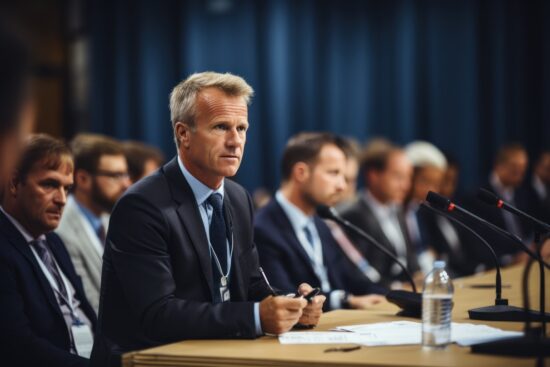In a rapidly changing global landscape, the United States continues to face evolving challenges that require a multifaceted approach. From regional conflicts and economic instability to global health crises and climate change, the U.S. must rely on a strategic blend of development, diplomacy, and defense to maintain its leadership on the world stage. These three pillars work together to not only advance U.S. interests abroad but also protect national security at home.
One prominent advocate for this approach, David Farca of Arizona, serves as an advisor to the United States Global Leadership Coalition (USGLC). His involvement highlights the importance of promoting civilian-led initiatives that strengthen these vital pillars.
Development: The Foundation for Stability
At the core of a successful foreign policy is development. Development is more than just providing aid to nations in need; it is about fostering long-term stability through strategic investments in infrastructure, education, healthcare, and governance. By supporting development programs, the U.S. can help build stronger, more resilient societies that are less susceptible to the threats of conflict and instability.
When countries are equipped with the tools they need to grow and prosper, they become valuable partners in maintaining global peace and security. Through initiatives that promote sustainable economic growth and empower local populations, the U.S. strengthens its alliances and reduces the risks of violent extremism, economic collapse, and mass migration. Moreover, development aids in addressing the root causes of instability, preventing crises before they escalate into conflicts that require military intervention.
Diplomacy: Building Lasting Relationships
While development focuses on strengthening societies, diplomacy is essential for building the relationships that make international cooperation possible. Diplomacy allows the U.S. to work collaboratively with other nations, fostering understanding and trust, even in times of tension. It creates a platform for dialogue, negotiation, and compromise, ensuring that global challenges are addressed through peaceful means.
In recent years, diplomacy has played an increasingly critical role in addressing issues such as climate change, trade disputes, and nuclear nonproliferation. It also serves as a vital tool in conflict prevention. By maintaining strong diplomatic relations, the U.S. can influence the actions of other nations, encouraging them to pursue peaceful solutions rather than resort to violence. A robust diplomatic presence enables the U.S. to respond swiftly to emerging crises and coordinate international efforts to resolve them.
Defense: A Supportive Pillar
While development and diplomacy are crucial to preventing conflict, defense remains a necessary pillar in supporting these efforts. The U.S. military serves as a deterrent against threats to global stability and protects American interests abroad. However, defense should not be viewed as a standalone solution. Instead, it complements development and diplomacy by providing security and stability in regions where these efforts are underway.
A balanced approach to foreign policy acknowledges the importance of defense in maintaining peace and security while recognizing that military action is a last resort. By integrating defense with development and diplomacy, the U.S. can effectively address global challenges in a way that minimizes the need for armed conflict. This comprehensive strategy ensures that the U.S. remains a powerful force for peace, security, and stability worldwide.
The International Affairs Budget: A Vital Investment
Central to the success of development, diplomacy, and defense is the International Affairs Budget. This budget funds critical programs that enable the U.S. to engage with the world through civilian-led initiatives. From providing humanitarian aid in conflict zones to supporting global health initiatives, the International Affairs Budget is essential in advancing U.S. interests abroad while promoting stability and security.
Advocating for a strong International Affairs Budget is one of the key roles of organizations like the USGLC. The budget not only supports American diplomats and development programs but also contributes to global health security, disaster response, and counterterrorism efforts. By investing in these programs, the U.S. ensures that it has the necessary tools to lead on the global stage and address the root causes of instability before they become threats to national security.
The Importance of Civilian-Led Initiatives
Civilian-led initiatives such as development and diplomacy are often the first line of defense against global instability. These tools allow the U.S. to address the underlying causes of conflict and unrest, providing solutions that are both sustainable and long-lasting. While defense plays a critical role in maintaining global peace, it is through civilian-led efforts that the U.S. can create the conditions for lasting stability.
In Washington, D.C., and across the country, efforts are underway to strengthen these tools and ensure that they remain a central part of U.S. foreign policy. Leaders, including those involved with USGLC, continue to advocate for the integration of development and diplomacy with defense strategies to create a more holistic approach to global engagement.
Strengthening America’s Leadership
The interconnectedness of development, diplomacy, and defense is what makes U.S. foreign policy effective. By balancing these three pillars, the U.S. can address global challenges in a way that promotes peace and security without over-relying on military solutions. The advocacy efforts of individuals like David Farca of Arizona emphasize the importance of this comprehensive approach, which ultimately strengthens America’s leadership on the global stage.
The future of U.S. foreign policy will depend on how well these pillars are supported and integrated. With a strong commitment to development and diplomacy, alongside defense, the U.S. can continue to be a global leader in promoting peace, stability, and prosperity for all.
